The Saint of the Day
 |
 |
 |
 |
 |
 |
 |
St. Cyprian of Carthage - September 16
Biographical selection:
In his Treatise De Lapsis (On the lapsed), St. Cyprian (200-258) condemns too readily forgiving those who have apostatized through cowardice. It is understandable, he affirms, to forgive one who falls amidst severe tortures and then repents of his betrayal. He continues:
"But what wounds can be shown here by the vanquished, what cuts in gaping flesh, what crippling of their limbs, when it was not faith that fell in the fight, but loss of faith that forestalled the fight? The fallen has not the excuse that he was forced to the crime when the crime was his own choice.
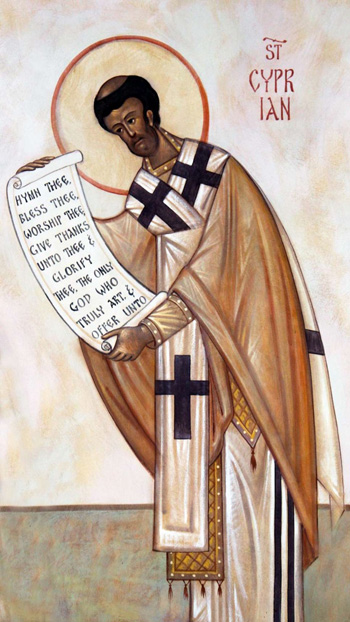 "I am not saying this to add to the load of my brethren's guilt: rather is to spur them on the prayer of reparation. For since it is written: They that call you blessed are leading you into error and confusing the path of your feet, he who soothes the sinner with comforting flatteries only encourages the sinful appetite; he is not checking crime but fostering it. …
"I am not saying this to add to the load of my brethren's guilt: rather is to spur them on the prayer of reparation. For since it is written: They that call you blessed are leading you into error and confusing the path of your feet, he who soothes the sinner with comforting flatteries only encourages the sinful appetite; he is not checking crime but fostering it. …
"Therefore, the duty of the Bishop of the Lord is, not to deceive with false flatteries, but to provide the remedies needed for salvation. He is a poor doctor whose timid hand spares the swelling, festering wound, and who, by letting the poison remain buried deep in the body, only aggravates the ill.
"The wound must be cut open, the infected parts cut out, and the wound treated with stringent remedies. Let the patient shout and cry never so much, let him protest in exasperation at the pain – later he will be grateful, when he feels his health restored.
"For, dear brethren, there has now appeared a new source of disaster and, as if the fierce storm of persecution had not been enough, there has come to crown it a subtle evil, an innocent-seeming pestilence, which masquerades as compassion. Contrary to the full strength of the Gospel, contrary to the law of Our Lord and God, through certain people's presumption a deceptive readmission to Communion is being granted, a reconciliation that is null and void, one that imperils the givers and is worthless to those who receive it.
"The latter no longer seek the slow painful road to recovery, nor the genuine cure through satisfaction done; what remorse they had has been snatched from their breasts, the gravity and enormity of their crime has been blotted from their memory.
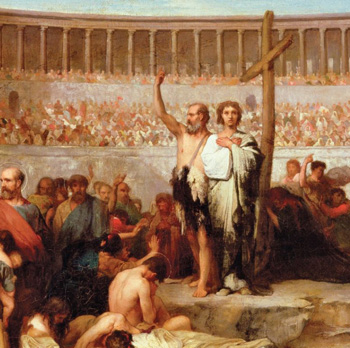 "The wounds they are dying of are covered up and, through pretence of lack of pain, the mortal affection deep in their organism is concealed. People coming back from the altars of Satan approach Our Lord's sacred Body, their hands still foul and reeking; while still belching, one may say, from the poisonous food of the idols …
"The wounds they are dying of are covered up and, through pretence of lack of pain, the mortal affection deep in their organism is concealed. People coming back from the altars of Satan approach Our Lord's sacred Body, their hands still foul and reeking; while still belching, one may say, from the poisonous food of the idols …
"They think that it is the pax which certain men are hawking about with honeyed words: it is not peace but war, and no one is in union with the Church who cuts himself off from the Gospel. …
"Their indulgence does not mean the granting of reconciliation but is frustration; it does not restore men to communion but bars them from it and from salvation. This is a new sort of persecution, a new sort of temptation by which the crafty Enemy still attacks the lapsed and ranges about wreaking unsuspected devastation: silencing lamentation, dispensing from repentance, abolishing all memory of crime: no breast is to sigh, no tears to flow, no long expiatory penance is to implore the mercy of a Lord so grievously offended.
"Yet is it written: Remember from whence thou art fallen: and do penance."
Comments of Prof. Plinio:
The lapsi were Catholics who, in the face of martyrdom, did not have courage to die for the Faith. They burned incense to the idols. Lapsus, or in the plural lapsi, the lapsed ones, means the ones who fell.
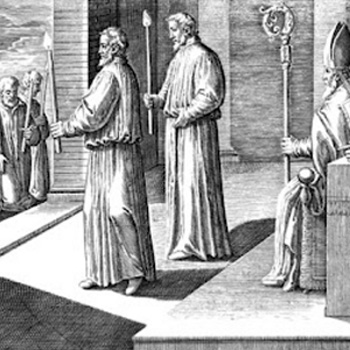 St. Cyprian said that it is wrong to forgive the lapsi too readily. Their crime was to throw a handful of incense in the pyre to honor the pagan gods; afterward they were released. Once free, each person would return to his home and start to have remorse. Then, he would go to the Catacombs to ask forgiveness.
St. Cyprian said that it is wrong to forgive the lapsi too readily. Their crime was to throw a handful of incense in the pyre to honor the pagan gods; afterward they were released. Once free, each person would return to his home and start to have remorse. Then, he would go to the Catacombs to ask forgiveness.
But, the presence of these cowards in the Catacombs made a bad influence on the future martyrs. Some of these future martyrs could be tempted to do the same, following this reasoning: "So, I burn incense to the idols, afterwards I ask forgiveness, and I end by going to Heaven all the same." So, if they were too easily received back into communion with the Church, their defection would become an invitation for others to do the same.
Thus the Church faced the problem on how to deal with those cowards. She could not deny them pardon, since she forgives everyone who comes to her with repentance and the firm purpose to not sin again, but to forgive easily was tantamount to curb the fidelity of her best elements.
This was not a problem for the Church only at that time. It is of perpetual interest, because the Church is always filled with lapsi, with persons who have that same mentality. What should be done with them?
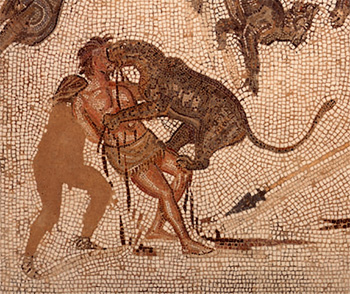 In the Middle Ages there were public penances. The man sinned and was given the penance to go on foot to St. James of Compostela. This served the Church well to maintain the seriousness of the penances. Is the regime of penances used in the Middle Ages applicable in our days: yes or no?
In the Middle Ages there were public penances. The man sinned and was given the penance to go on foot to St. James of Compostela. This served the Church well to maintain the seriousness of the penances. Is the regime of penances used in the Middle Ages applicable in our days: yes or no?
St. Cyprian said that when the person had clear signs of the torture he had suffered, the pardon could be more ready. But when the man was not tortured, what should be done? The Saint criticized those who promoted an easy forgiveness, saying that they confuse the path of fidelity and foster sin. These words could be applied to the majority of the clergy of our times. Today, it would be very difficult for St. Cyprian to speak as he did...
The position of the Church before the sinner can be summarized as follows:
There are three types of sinners that we should distinguish to understand the attitude of Our Lord in the Gospel and, afterwards, the attitude of the Church throughout her history.
First, there are sinners who sin, but censure the sin they committed. They know that what they did was bad and they lament their action and admire those who walk the right path. When they give a counsel, they advise others not to do what they did, but to follow the right path.
For these sinners the Church has the greatest patience and a ready pardon because they are persons who sinned by a censurable weakness, but who do not have what is most abominable in sin: that is, sympathy toward evil. They do not have that type of approval for evil that constitutes a sin of the spirit and not just a sin of the flesh.
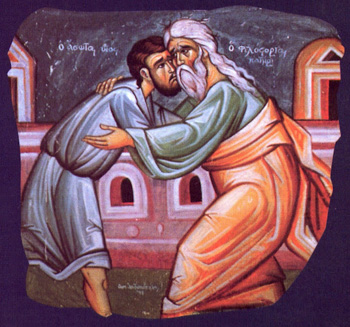 The main concern of the Church regarding these sinners, who have the sense of the gravity of their sin, is to not allow them to become discouraged. The Church counsels these persons to pray in order to obtain the extraordinary graces they need to stop commiting that sin. If a sinner insistently asks Our Lady for the grace to break away from that sin, he will receive an extraordinary grace to correct himself.
The main concern of the Church regarding these sinners, who have the sense of the gravity of their sin, is to not allow them to become discouraged. The Church counsels these persons to pray in order to obtain the extraordinary graces they need to stop commiting that sin. If a sinner insistently asks Our Lady for the grace to break away from that sin, he will receive an extraordinary grace to correct himself.
With this type of sinner we should have patience and mercy, and favor him as much as we can to prevent him from falling again. The great danger for this type of sinner is discouragement.
Second, there is another type of sinner who walks in the middle of the road. He knows that he did wrong, but is indifferent about the sin he committed. He thinks that those who commit the same sin are not doing anything wrong. He does not care about breaking the Commandments, because he believes that in the end he can confess and still go to Heaven. He has sympathy for those who commit the same sin; he does not admire those who practice the opposite virtue. This is the lukewarm man.
This type of sinner needs to be shaken because he is like a man who is sleeping, unaware of what is going on around him. He has lost the sense of the good and evil. It is necessary to shock him, to shout at him to break that outer crust of indifference. The danger for him is not discouragement; it is indifference, unconcern. It is necessary to be severe with this type of person.
Third, there is another type of sinner who lives in sin and is complacent with the sin he commits; he is even proud of it. He has sympathy and affection for sinners and has a militant hatred for those who live a life of virtue. He tries to seduce those who are on the path of virtue to commit sins.
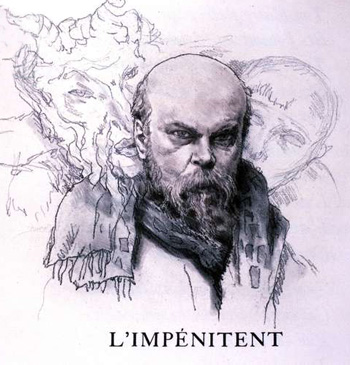 This type of sinner needs to be combated as one would a militant enemy.
This type of sinner needs to be combated as one would a militant enemy.
It is necessary to confront him and berate him publicly. We should behave as his enemies not only for the good of his soul – he will only respect virtue to the degree he sees the strength of virtue – but also for the good of those who he is influencing in a bad way. When I see a sinner inducing another to evil, my first reaction is not pity for the sinner. It is pity for the one who is being lured into evil. My way to protect the latter is to combat the former. So, we need to be militant.
These are the types of attitudes we should have with sinners.
Now, it is understandable that for the sinners of the first type the Church opens her floodgates and spill out torrents of graces through her Sacraments. Those who are in conditions to receive them must then ask for the Sacrament with peace of soul.
For the sinners of the second type, we understand that the Church must be more reserved. We also understand that the Church should be militant against the third type.
These are the different types of sin to which correspond different positions of the Church.


The Saint of the Day features highlights from the lives of saints based on comments made by the late Prof. Plinio Corrêa de Oliveira. Following the example of St. John Bosco who used to make similar talks for the boys of his College, each evening it was Prof. Plinio’s custom to make a short commentary on the lives of the next day’s saint in a meeting for youth in order to encourage them in the practice of virtue and love for the Catholic Church. TIA thought that its readers could profit from these valuable commentaries.
The texts of both the biographical data and the comments come from personal notes taken by Atila S. Guimarães from 1964 to 1995. Given the fact that the source is a personal notebook, it is possible that at times the biographic notes transcribed here will not rigorously follow the original text read by Prof. Plinio. The commentaries have also been adapted and translated for TIA’s site.
In his Treatise De Lapsis (On the lapsed), St. Cyprian (200-258) condemns too readily forgiving those who have apostatized through cowardice. It is understandable, he affirms, to forgive one who falls amidst severe tortures and then repents of his betrayal. He continues:
"But what wounds can be shown here by the vanquished, what cuts in gaping flesh, what crippling of their limbs, when it was not faith that fell in the fight, but loss of faith that forestalled the fight? The fallen has not the excuse that he was forced to the crime when the crime was his own choice.

St. Cyprian reprimands those who allow the lapsi to return without due penance
"Therefore, the duty of the Bishop of the Lord is, not to deceive with false flatteries, but to provide the remedies needed for salvation. He is a poor doctor whose timid hand spares the swelling, festering wound, and who, by letting the poison remain buried deep in the body, only aggravates the ill.
"The wound must be cut open, the infected parts cut out, and the wound treated with stringent remedies. Let the patient shout and cry never so much, let him protest in exasperation at the pain – later he will be grateful, when he feels his health restored.
"For, dear brethren, there has now appeared a new source of disaster and, as if the fierce storm of persecution had not been enough, there has come to crown it a subtle evil, an innocent-seeming pestilence, which masquerades as compassion. Contrary to the full strength of the Gospel, contrary to the law of Our Lord and God, through certain people's presumption a deceptive readmission to Communion is being granted, a reconciliation that is null and void, one that imperils the givers and is worthless to those who receive it.
"The latter no longer seek the slow painful road to recovery, nor the genuine cure through satisfaction done; what remorse they had has been snatched from their breasts, the gravity and enormity of their crime has been blotted from their memory.

The noble sacrifice of the martyr must be supported by punishing the cowards
"They think that it is the pax which certain men are hawking about with honeyed words: it is not peace but war, and no one is in union with the Church who cuts himself off from the Gospel. …
"Their indulgence does not mean the granting of reconciliation but is frustration; it does not restore men to communion but bars them from it and from salvation. This is a new sort of persecution, a new sort of temptation by which the crafty Enemy still attacks the lapsed and ranges about wreaking unsuspected devastation: silencing lamentation, dispensing from repentance, abolishing all memory of crime: no breast is to sigh, no tears to flow, no long expiatory penance is to implore the mercy of a Lord so grievously offended.
"Yet is it written: Remember from whence thou art fallen: and do penance."
Comments of Prof. Plinio:
The lapsi were Catholics who, in the face of martyrdom, did not have courage to die for the Faith. They burned incense to the idols. Lapsus, or in the plural lapsi, the lapsed ones, means the ones who fell.

The lapsi return to the door of the Pope to seek communion with the Church
But, the presence of these cowards in the Catacombs made a bad influence on the future martyrs. Some of these future martyrs could be tempted to do the same, following this reasoning: "So, I burn incense to the idols, afterwards I ask forgiveness, and I end by going to Heaven all the same." So, if they were too easily received back into communion with the Church, their defection would become an invitation for others to do the same.
Thus the Church faced the problem on how to deal with those cowards. She could not deny them pardon, since she forgives everyone who comes to her with repentance and the firm purpose to not sin again, but to forgive easily was tantamount to curb the fidelity of her best elements.
This was not a problem for the Church only at that time. It is of perpetual interest, because the Church is always filled with lapsi, with persons who have that same mentality. What should be done with them?

A martyr being attacked by a leopard
St. Cyprian said that when the person had clear signs of the torture he had suffered, the pardon could be more ready. But when the man was not tortured, what should be done? The Saint criticized those who promoted an easy forgiveness, saying that they confuse the path of fidelity and foster sin. These words could be applied to the majority of the clergy of our times. Today, it would be very difficult for St. Cyprian to speak as he did...
The position of the Church before the sinner can be summarized as follows:
There are three types of sinners that we should distinguish to understand the attitude of Our Lord in the Gospel and, afterwards, the attitude of the Church throughout her history.
First, there are sinners who sin, but censure the sin they committed. They know that what they did was bad and they lament their action and admire those who walk the right path. When they give a counsel, they advise others not to do what they did, but to follow the right path.
For these sinners the Church has the greatest patience and a ready pardon because they are persons who sinned by a censurable weakness, but who do not have what is most abominable in sin: that is, sympathy toward evil. They do not have that type of approval for evil that constitutes a sin of the spirit and not just a sin of the flesh.

The Church shows mercy to the penitent like the father with the prodigal son
With this type of sinner we should have patience and mercy, and favor him as much as we can to prevent him from falling again. The great danger for this type of sinner is discouragement.
Second, there is another type of sinner who walks in the middle of the road. He knows that he did wrong, but is indifferent about the sin he committed. He thinks that those who commit the same sin are not doing anything wrong. He does not care about breaking the Commandments, because he believes that in the end he can confess and still go to Heaven. He has sympathy for those who commit the same sin; he does not admire those who practice the opposite virtue. This is the lukewarm man.
This type of sinner needs to be shaken because he is like a man who is sleeping, unaware of what is going on around him. He has lost the sense of the good and evil. It is necessary to shock him, to shout at him to break that outer crust of indifference. The danger for him is not discouragement; it is indifference, unconcern. It is necessary to be severe with this type of person.
Third, there is another type of sinner who lives in sin and is complacent with the sin he commits; he is even proud of it. He has sympathy and affection for sinners and has a militant hatred for those who live a life of virtue. He tries to seduce those who are on the path of virtue to commit sins.

Paul Verlaine, who promoted the Decadent movement, poses proudly as 'The Impenitent'
It is necessary to confront him and berate him publicly. We should behave as his enemies not only for the good of his soul – he will only respect virtue to the degree he sees the strength of virtue – but also for the good of those who he is influencing in a bad way. When I see a sinner inducing another to evil, my first reaction is not pity for the sinner. It is pity for the one who is being lured into evil. My way to protect the latter is to combat the former. So, we need to be militant.
These are the types of attitudes we should have with sinners.
Now, it is understandable that for the sinners of the first type the Church opens her floodgates and spill out torrents of graces through her Sacraments. Those who are in conditions to receive them must then ask for the Sacrament with peace of soul.
For the sinners of the second type, we understand that the Church must be more reserved. We also understand that the Church should be militant against the third type.
These are the different types of sin to which correspond different positions of the Church.

 | |
|
|
The texts of both the biographical data and the comments come from personal notes taken by Atila S. Guimarães from 1964 to 1995. Given the fact that the source is a personal notebook, it is possible that at times the biographic notes transcribed here will not rigorously follow the original text read by Prof. Plinio. The commentaries have also been adapted and translated for TIA’s site.


